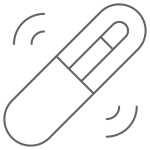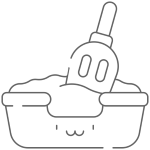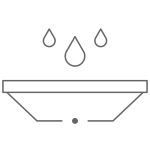Cats can make excellent companions and are wonderful pets. However, with an average lifespan ranging from 15-20 years, owning a cat is a long-term commitment and their needs must be carefully considered.

Vaccinations & Parasite control
You should ensure their vaccinations are up to date – some kittens and cats may need booster vaccinations after you acquire them. Cats should be vaccinated annually, this is also important as they receive a health check every year. Since cats age much faster than a human, health issues can develop across much shorter time periods. A cat is considered senior once over the age of 7. The risk of cancer, diabetes, obesity, arthritis, heart disease and other serious conditions all increase with age.
We recommend that your cat should on parasite control that covers them against fleas, intestinal worms and heartworm. There are many different products that are available and we can help you choose one that is suitable for your cat.

Microchipping
Cats should be microchipped and registered with the council by 6 months of age under The Cat Act WA 2011. This is important for ownership records but very important in case they become lost or stolen.
Desexing
By law cats must be desexed by 6 months of age. This is important to reduce the amount of stray cats on our streets but also to prevent undesirable behaviours and related medical problems.
A Secure Indoor Environment
We recommend keeping your cats as indoor cats where possible to ensure their safety. Increasingly, cat owners are using cat enclosures to provide a safe outdoor area for cats. Placed in a weatherproof area, and these netted enclosures keep them safe from fights with other cats in the neighbourhood and protect local wildlife from cats’ natural hunting instincts.
For indoor cats, it can be a good idea to provide a scratching post to keep their claws in good condition and reduce the chances of your furniture being scratched.

Litter Tray
Cats like to be clean at all times. As a result, cats can easily be toilet trained if a litter tray filled with a suitable cat litter is available. The litter tray should be cleaned daily to remove faeces and the litter itself changed frequently. Ensure the litter tray is placed in a quiet and private location. You may even need multiple trays if you have more than one pet cat. A good rule of thumb is one tray for each cat plus one extra.
Exercise & Climbing
All cats need to exercise. As cats naturally like climbing and perching themselves up high, trees and fences, for example, provide good opportunities for them if they have outdoor access. Indoor cats, however, will use furniture to climb and perch. Once again, having a scratch pole or indoor cat gym will give an indoor cat an effective alternative. Providing higher perching locations will also give your cats a more enriched environment. Feeding enrichment such as treat puzzles can also help keep your indoor cat active.
Grooming
Some cats require grooming assistance from their owners to remove excess hair. This helps in the reduction of furballs and matted fur, which if left, may become uncomfortable for your cat or more significant health issues. During the moulting season daily brushing is essential and food designed specifically to assist with the reduction of hairballs will also help your cat process shed hair. Unlike dogs, you should not need to bathe a cat. Some long hair cats may require a groom which can be done in clinic under a light sedation.
Diet
Feeding an appropriate diet to your cat is important. Cats are obligate carnivores that require certain amino acids from their food. It is important to ensure your cat is fed a good quality complete and balanced food. It is also important to feed appropriate to their life stage, for example, kitten or senior cat food. When it comes to feeding, most cats like to graze, so we recommend offering small amounts often. Young, healthy cats require a high protein and fat diet. There are many formulations of cat food available and we recommend discussing your cat’s individual nutritional needs with us to choose the most suitable formula. Older cats and those with certain medical conditions may require a prescription diet, which we can discuss with you as part of a treatment plan.

Water & Milk
Ensure a fresh water bowl is accessible at all times, especially if they have a dry food diet. We recommend that you avoid offering cow’s milk for your cat to drink, as this can cause stomach upsets.
Regular Health check ups
Cats require a minimum of one health check per year. Regular visits help us diagnose, treat or even prevent health problems before they become life-threatening. Routine vaccinations, worming and flea control form the basics of feline medical care. We can also provide additional guidance on nutrition, behaviour, training and life-stage treatments available.
We welcome you to book an appointment with us to discuss how to keep your cat in optimum mental and physical health.
